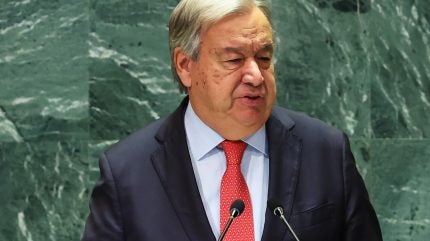
UN secretary-general António Guterres has said “doubling down on fossil fuels is absurd” and “almost everywhere, solar and wind are the cheapest source of new electricity”, as global policymakers, climate experts and lobbyists gather in Baku, Azerbaijan for COP29.
He added that by the next COP meeting, countries “must deliver new economy-wide national climate action plans, and you have agreed that your new plans will align with 1.5 degrees” in an address at the COP29 World Leaders’ Climate Action Summit Opening Ceremony on Tuesday.
“That means they must cover all emissions and the whole economy; advance global goals to triple renewables capacity, double energy efficiency and halt deforestation by 2030; and slash global fossil fuel production and consumption 30% by the same date,” he said.
COP, or the Conference of the Parties, is an annual global summit where countries negotiate climate action strategies and assess their progress.
The conferences have in the past led to large-scale changes. The 21st COP (COP21) led to the 2015 Paris Agreement, which saw nearly 200 countries – including the US and China, the world’s two largest polluters – agree to take action to limit global temperature increases to 1.5°C above pre-industrial levels.
Portuguese politician and diplomat Guterres, who has headed the UN since 2017, said the world is in the “final countdown to limit global temperature rise to 1.5°C, and “time is not on our side”.
He urged attendees to focus on three priorities.
“First, emergency emissions reductions. To limit global temperature rise to 1.5°C, we must cut global emissions 9% every year,” he added.
At this COP, attendees must agree to fair rules, with “effective carbon markets that support that fight”. Guterres also called for markets that “respect the rights of local communities, and leave no space for greenwashing or land-grabbing”.
Second, he called for governments to do more “to protect your people from the ravages of the climate crisis” and said that the “most vulnerable are being abandoned to climate extremes”.
“The gap between adaptation needs and finance could reach up to $359bn a year by 2030. These missing dollars are not abstractions on a balance sheet: they are lives taken, harvests lost and development denied,” he said.
Last, finance needs to become a “priority”, with developing countries eager to act “facing many obstacles: scant public finance; raging cost of capital; crushing climate disasters; and debt servicing that soaks up funds.”
“Last year, developing and emerging markets outside China received just $0.15 for every dollar invested in clean energy globally,” he said, and COP29 must “tear down the walls to climate finance” and “developing countries must not leave Baku empty-handed. A deal is a must.”
This year’s conference will focus primarily on climate finance. It will aim for something called a ‘new collective quantified goal’ (NCQG) for climate financing. This goal will replace a previous target of $100bn annually by 2020, which developed nations failed to meet on time.
The NCQG is seen as essential for mobilising funding for developing countries to help them address climate change.
One report from the Grantham Institute of the London School of Economics has estimated that developing countries outside China will need approximately $1trn of investment annually by 2030 to transition to low-emission, climate-resilient economies.
Guterres also outlined five elements that are “critical to success”.
These are a significant increase in concessional public finance; a clear indication of how public finance will mobilise the trillions of dollars developing countries need; tapping innovative sources, particularly levies on shipping, aviation and fossil fuel extraction; the development of a framework for greater accessibility, transparency and accountability; and boosting lending capacity for bigger and bolder multilateral development banks.



